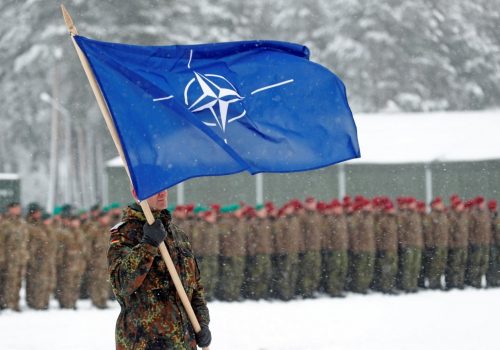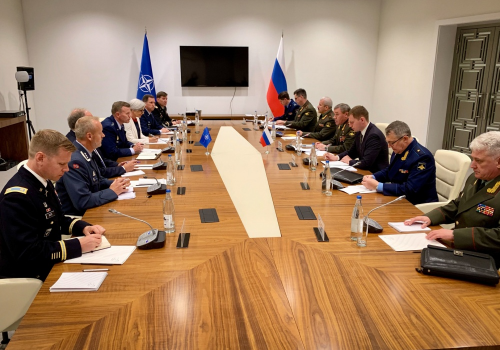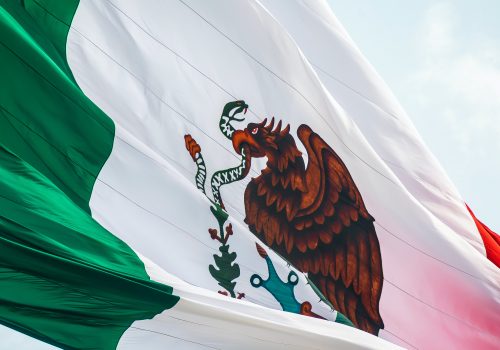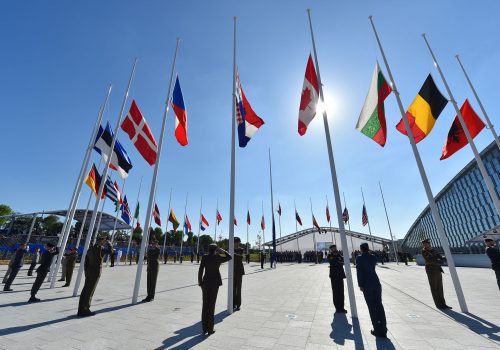End the Russian veto on Georgian accession
At NATO’s 2008 Bucharest Summit, the allies refused to go along with a US push to offer Georgia a Membership Action Plan (MAP), but agreed that it would someday become a member of the Alliance.1Hugh Williamson, “Germany Blocks Ex-Soviets’ NATO Entry,” Financial Times, April 1, 2008, https://www.ft.com/content/ab8eb6a6-ff44-11dc-b556-000077b07658 Germany and France intended for this equivocation to allay Russian objections, yet it was seized upon by Vladimir Putin as an opportunity to block Georgia’s path to the Alliance. In August 2008, a mere four months after the Bucharest Summit, Russia invaded Georgia and occupied twenty percent of its internationally recognized territory. With some creativity and bold political will, however, Georgia’s accession into NATO is still feasible, despite the Russian occupation.
The consequences of the five-day war in 2008 are still felt today. Thousands of Russian troops occupy Abkhazia and the Tskhinvali Region (more commonly known as South Ossetia),2The term “South Ossetia” is commonly used to describe the area north of Tbilisi that is under illegal Russian occupation. This name is derived from the South Ossetian Autonomous Oblast created in 1922 by the Soviet Union. In 1991, the South Ossetian Autonomous Oblast declared independence from the Georgian Soviet Socialist Republic, which resulted in the 1991–92 South Ossetia War. When Georgia regained its independence from the Soviet Union later in 1991, it established eleven internal subdivisions (two autonomous republics and nine regions). The area in Georgia that attempted to break away in 1991, that now has been under Russian occupation since 2008, is commonly referred to as “South Ossetia.” However, “South Ossetia” is not one of the eleven subdivisions of Georgia, but instead includes parts of Mtskheta-Mtianeti, Shida Kartli, Imereti, Racha-Lechkhumi, and the Kvemo Svaneti regions. Since using the term “South Ossetia” feeds into Russia’s propaganda, this essay will refer to this region as the “Tskhinvali Region.” (Tskhinvali is the largest city under Russian occupation.) both of which Moscow recognized as sovereign states after the war in flagrant violation of international law and the principles of the Organization for Security and Co-operation in Europe (OSCE). To this day, Russian aggression continues with “creeping annexations”3McCain Institute, “McCain Institute Unveils Tracker of Russian ‘Borderization’ in Georgia,” October 16, 2019, https://www.mccaininstitute.org/news/mccain-institute-unveils-tracker-of-russian-borderization-in-georgia/; McCain Institute, Heritage Foundation, and Economic Policy Research Center in Georgia, “Russian Borderization in Georgia,” October 2019, https://uploads.knightlab.com/storymapjs/183ab9d69fc702c33a79bfcd27b7b4d8/russian-borderization-in-georgia/index.html of even more Georgian territory. Russia also carries out cyberattacks4Ryan Browne, “US and UK Accuse Russia of Major Cyber Attack on Georgia,” CNN, February 20, 2020, https://www.cnn.com/2020/02/20/politics/russia-georgia-hacking/index.html. and disinformation campaigns5McCain Institute, “Tracking and Refuting Disinformation in Georgia: Social Media Monitoring and Analysis Final Report,” November 2019, https://www.mccaininstitute.org/wp-content/uploads/2019/11/final-report_disinformationgeogia.pdf in an attempt to discredit the Georgian government and undermine state institutions. However, the most lasting negative impact of the 2008 war has been the de facto veto Russia now holds over Georgia’s NATO membership.
To be sure, NATO members have legitimate concerns about Georgia joining the Alliance. For example, considering its geography, could NATO develop a realistic plan to reinforce and defend Georgia if called upon? Turkey is very important to this issue. There are also concerns about whether Georgia’s democracy and political stability have developed enough to justify membership. One of the biggest concerns shared by North American and European policy makers alike is Russia’s occupation of Georgian territory. Many allies are worried that if Georgia were to be granted membership, then NATO’s Article 5 security guarantee could mean an immediate conflict with Russia over these occupied regions. However, this challenge is not insurmountable.
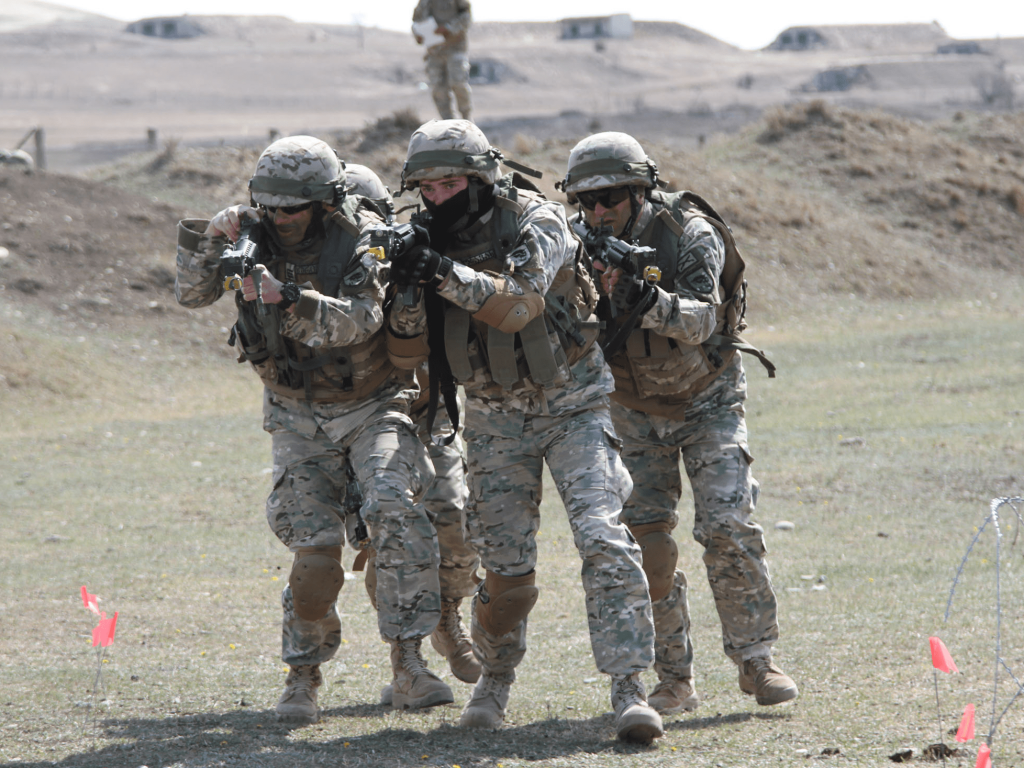
One idea worth considering is inviting Georgia—including Abkhazia and the Tskhinvali Region—to join NATO, but only covering the areas outside of the two occupied regions under NATO’s Article 5 security guarantee.
Soldiers participate in a drill as part of the US-Georgian bilateral Georgia Defence Readiness Programme during a visit to Georgia by NATO’s Military Committee.
(Source: NATO Flickr)
One idea worth considering is inviting Georgia—including Abkhazia and the Tskhinvali Region—to join NATO, but only covering the areas outside of the two occupied regions under NATO’s Article 5 security guarantee. This would persist for at least the foreseeable future and strike a reasonable compromise between a Georgia “whole and free” in NATO and addressing concerns over security guarantees in the contested regions.
To make this work, NATO would need to amend Article 6 of the 1949 North Atlantic Treaty, which defines where Article 5 applies, to temporarily exclude Abkhazia and the Tskhinvali Region. This amendment could be made during Georgia’s accession-protocol process. Accession protocols are essentially “amendments or additions to the Treaty, which once signed and ratified by Allies, become an integral part of the Treaty itself and permit the invited countries to become parties to the Treaty.”6NATO (North Atlantic Treaty Organization), “NATO Enlargement,” last updated May 5, 2020, https://www.nato.int/summit2009/topics_en/05-enlargement.html However, it should be made clear that the amendment to Article 6 would only be a temporary measure until Georgia’s full and internationally recognized territory is restored by peaceful means.
Despite sounding quixotic, the proposal has merits. In 2010, Georgia unilaterally pledged not to use force to restore its control over the two regions under Russian occupation.7Civil Georgia, “Georgia Makes ‘Unilateral Pledge’ of Non-Use of Force,” November 23, 2010, https://old.civil.ge/eng/article.php?id=22880 If Georgia will not use its own armed forces to liberate these regions, there is no need for an Article 5 security guarantee that covers Abkhazia and the Tskhinvali Region.8A similar proposal would not apply to Ukraine because Kyiv does not have a non-use of force pledge regarding Russian-occupied Crimea and the eastern Donbas region of Ukraine. While the fate of NATO membership for Georgia and Ukraine were linked in 2008, more than a decade later, it is time for a decoupling. This is not meant to be a criticism of Ukraine; NATO should aspire to bring Ukraine into the Alliance someday. This is merely a reflection of the different realities in the two countries.
Watch the video
This would not be without precedent as Article 6 has been amended and modified before. In 1951, just two years after NATO’s formation, it was modified prior to Greece and Turkey joining the Alliance. In 1963, Article 6’s meaning was amended when the North Atlantic Council acknowledged that the “Algerian Departments of France” no longer applied since Algeria had gained independence. The Council decided to keep the wording but stripped the words “Algerian Departments of France” of their legal impact.9Antoaneta Boeva and Ivan Novotny, “Scope and Historical Developments of Article 6,” Emory International Law Review, 34 (2019): Rev. 121, https://law.emory.edu/eilr/content/volume-34/issue-special/articles/scope-historical-developments-article-6.html Similar modifications could be made for Georgia.
Moreover, there are countless examples of NATO members that do not have all their territory under the protection of Article 5, including the United States with its territory of Guam and the state of Hawaii in the Pacific Ocean, the United Kingdom with the Falkland Islands in the South Atlantic Ocean, and France with Réunion Island in the Indian Ocean.
At the time of admitting Greece and Turkey into NATO in 1952, World War II hero and US Army Gen. Omar Bradley, while serving as the first chairman of the NATO Military Committee, made the case to US senators that Greece and Turkey would bolster [US Army Gen. Dwight D.] Eisenhower’s southeastern flank and would “serve as powerful deterrents to aggression.”10George McGhee, The US-Turkish-NATO Middle East Connection: How the Truman Doctrine and Turkey’s NATO Entry Contained the Soviets (London: Palgrave Macmillan, 1990), p. 88, https://link.springer.com/content/pdf/10.1007%2F978-1-349-20503-5_6.pdf Today, the same case could be made for Georgia. Georgia’s geostrategic location in the South Caucasus, its professional and capable military (and its political will to use it), and its commitment to liberty and democracy would make it a powerful addition to the stability of the transatlantic community.
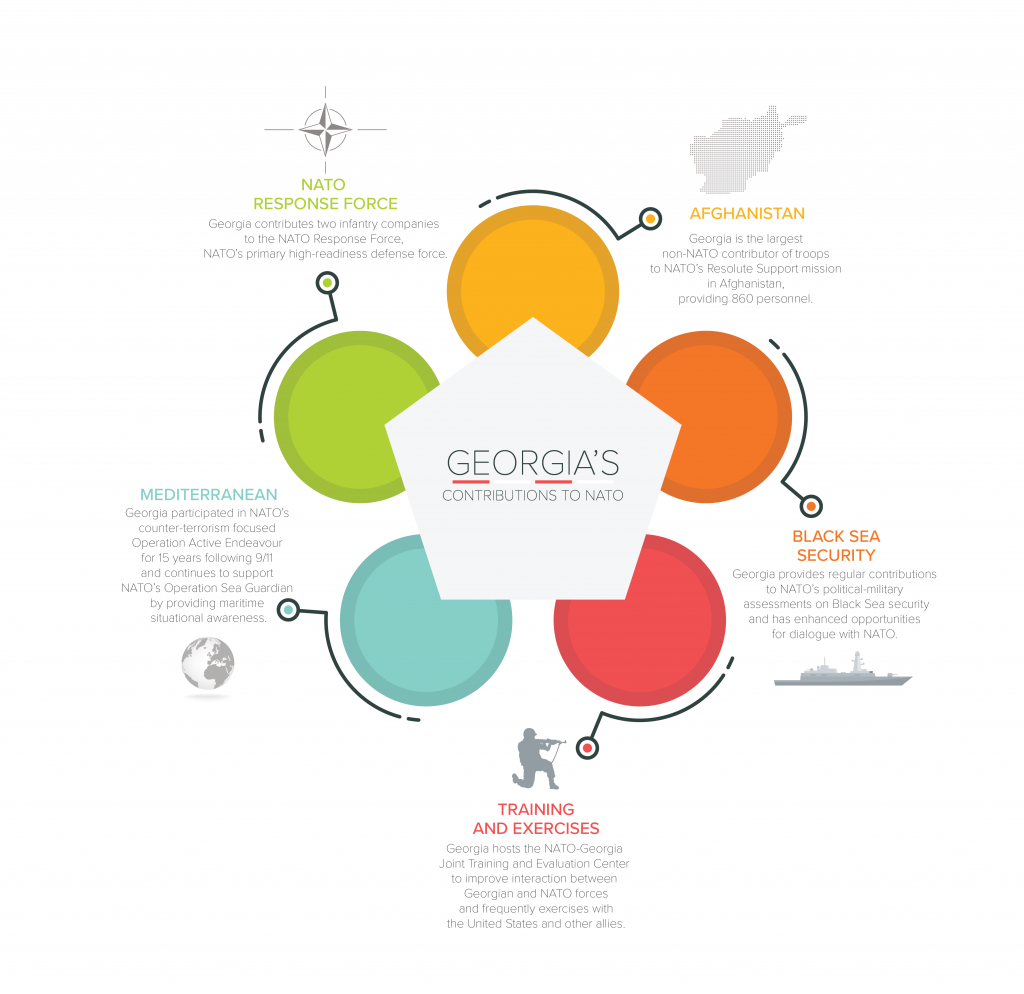
Georgia’s geostrategic location in the South Caucasus, its professional and capable military (and its political will to use it), and its commitment to liberty and democracy would make it a powerful addition to the stability of the transatlantic community.
However, the onus to make this case does not fall solely on the United States and its NATO allies. Georgians, too, must take action to speed along their nation’s membership prospects. First, the Georgian government should, at least privately, acknowledge to NATO members that it is willing to join the Alliance without Abkhazia or the Tskhinvali Region under Article 5 protection until these occupied regions have been peacefully returned to Georgia. Tbilisi must first find the political will to support the idea of amending Article 6. Until signals are sent to allied capitals that the Georgian government is on board, do not expect movement on this issue from the Alliance.
Second, the issue of NATO membership must remain above domestic party politics in Georgia. It must be perceived as a unifying national effort. The leaders of all of Georgia’s major political parties should sign a joint letter that explicitly states their support for the country’s transatlantic aspirations and temporarily amending Article 6. In addition, the official Georgian delegation to the next NATO Summit should include the leaders from opposition parties who support Georgian membership in the Alliance—something that should become routine practice. These measures will show NATO members that even though Georgia is a politically divided country (like most democracies around the world), there is political unity on the issue of NATO membership. These proactive efforts from Georgia would energize NATO capitals on the issue.
Unfortunately, this proposal is not without its challenges. Russia is likely to launch a disinformation campaign to claim that amending Article 6 to temporarily exclude the occupied regions is proof that the Georgian people do not want them back. While Russian tactics are a legitimate concern, it should not prevent policy makers from pursuing this proposal. Russia is conducting perpetual disinformation campaigns against the Georgian people and will continue to do so, regardless of whether or not Article 6 is amended. Further, countering Russian disinformation will be crucial for the success of this proposal.
Instead of succumbing to Russian efforts to mislead, Georgian and NATO authorities can get ahead of the debate by launching a public relations campaign to explain the proposal and how it would mutually benefit Georgia and the Alliance. It should be made crystal clear that NATO and both the Georgian and US governments are not changing their policies on Georgia’s territorial integrity. Such a decisive response will imbue the proposal with a spirit of defiance and clear political will, extend the collective security umbrella against Russia’s de facto veto, and at the very least, surprise Moscow. At best, it would welcome a new member into the transatlantic community that is fiercely committed to enduring deterrence. Equally valuable, admitting Georgia would cement NATO’s open-door policy for qualified countries as an important contribution to transatlantic security since the first round of enlargement in 1952. This policy has helped to ensure the Alliance’s central place as the prime guarantor of security in Europe and admitting Georgia would extend that guarantee further in the contested Black Sea region.
Some NATO members may not immediately support amending Article 6. Since NATO makes all of its major decisions by consensus, the process of welcoming Georgia into the Alliance under the terms outlined here would require strong leadership, intense diplomatic negotiations, and, perhaps most importantly, patience. Policy makers should not expect universal support overnight. As the NATO powers historically most reluctant to offer Georgia a MAP, Germany and France will likely object to this proposal early in the process. This is to be expected, but if nothing else, there will finally be a meaningful debate about a responsible and realistic way to welcome Georgia into the Alliance. The debate would push Germany and France to put forward an alternative proposal, which thus far they have failed to provide.
Finally, it is crucial that the United States play a leadership role by building a coalition of support for this proposal inside the Alliance. Washington can leverage its “special relationship” with the UK and focus on outreach to NATO’s Central and Eastern European member states, which will be generally supportive. This should also include working with Turkey, one of the Alliance’s strongest supporters of Georgian membership.11Luke Baker, “Turkish Foreign Minister Calls for Enlarged NATO, Georgia Membership,” Reuters, January 23, 2020, https://mobile.reuters.com/article/amp/idUSKBN1ZM1HB
Key to selling NATO members on the proposal will be dispelling the myth that Georgia cannot join the Alliance until the issue of its disputed territory is peaceably resolved. This is a common misconception that has its roots in the 1995 Study on NATO Enlargement carried out by the Alliance. A closer reading of this document shows that a territorial dispute does not necessarily prevent a country from joining the Alliance. Here is what the study says on the matter:
“States which have ethnic disputes or external territorial disputes, including irredentist claims, or internal jurisdictional disputes must settle those disputes by peaceful means in accordance with OSCE principles. Resolution of such disputes would be a factor in determining whether to invite a state to join the Alliance.”12NATO (North Atlantic Treaty Organization), “Study on NATO Enlargement,” last updated November 5, 2008, https://www.nato.int/cps/en/natohq/official_texts_24733.htm
While it is in NATO’s best interest that any outstanding border disputes be resolved before members join the Alliance, the last sentence of the aforementioned paragraph clearly states that the resolution of such disputes would be “a factor,” and not the factor, in determining whether to invite a country to join NATO.
Russia likely will not end its occupation of Georgian territory in the near future, so creativity regarding Georgia’s future NATO membership is necessary. Amending Article 6 to state that Russian-occupied regions would be temporarily excluded from the Article 5 security protection is a realistic, responsible, and reasonable way to admit Georgia into NATO while accounting for concerns on both sides of the Atlantic. Equally important, it will send a strong message to Moscow that it no longer has a de facto veto on NATO enlargement.
* * *
Luke Coffey is the director of the Douglas and Sarah Allison Center for Foreign Policy Studies at the Heritage Foundation.
Alexis Mrachek is a research associate for Russia and Eurasia at the Douglas and Sarah Allison Center for Foreign Policy Studies at the Heritage Foundation.
Explore the podcast series
Related NATO 20/2020 essays
Related program

The Transatlantic Security Initiative, in the Scowcroft Center for Strategy and Security, shapes and influences the debate on the greatest security challenges facing the North Atlantic Alliance and its key partners.
Subscribe for events and publications on transatlantic security
Sign up for updates from the Atlantic Council’s Transatlantic Security Initiative, covering the debate on the greatest security challenges facing the North Atlantic Alliance and its key partners.
Image: US Soldiers wait near their Stryker vehicle during the tactical road march for the Noble Partner 20 exercise in Georgia. (Source: Defense Visual Information Database System)
